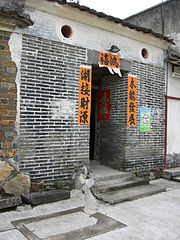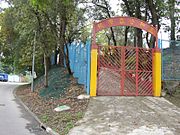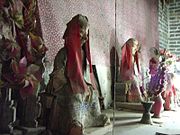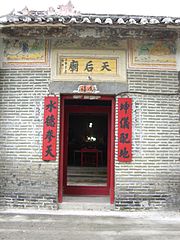- Muk Wu
-
Muk Wu Village (Chinese: 木湖村) in Ta Kwu Ling is situated in the north of the New Territories across the Man Kam To border crossing point in Hong Kong.
It is therefore inaccessible to non-permit holders, but these can be obtained in Fanling, Sheung Shui Closed Area Permit police station. As the name suggests, originally the village had fertile land with trees and streams derived from the Chinese characters: "wooden" (木); "lake" (湖). However unbelievable this may seem, one only needs to look where the village is located. That is, on the northern periphery right next to the border fence, the Shenzhen River is only a few feet away. Therefore, the village is situated where one can take a good look at the breathtaking view of Shenzhen's city skyscrapers and admire its ongoing development. It can also be exciting to look at Shenzhen from the village in the evening when the high-rises light up. It is not like Hong Kong's 'Symphony Of Lights' along the harbour, but maintains its unique character and focus as a 'Window to the East'.
Contents
Directions
To get there, a 73k bus or 59k minibus will take you virtually all the way. You can catch a 73k at Sheung Shui bus station as well as the 59k, this being a little more difficult unless you know where to get off. The 73k terminates at Man Kam To Bus Terminus and then you will need to walk at least 70 metres along Lin Ma Hang Road and turn left at the sign post for Muk Wu Village.
Attractions
The village road meanders down into the village court and main door. This door (gate tower) and stone floor is the original Qing dynasty design as well as a few houses that have been unoccupied maintained their identity as a village with a long history. There are of course many new houses built not higher than three storeys.
Within the village there also stands a Tin Hau Temple, village hall (sun teng) or shrine and several Ancestral rooms (xi fong). The temple is beautifully decorated and very well kept by the villagers. It was built around 1912-1913.[1] It is located about 50 metres away left as one faces the village door.
Man-made water wells are plentiful but the main one where most villagers used to draw water from is very large in comparison. Its disuse came about when alternative means of transporting water was sought. Efficient and effective land cultivation was of prime importance and therefore improvements of water pipe systems obviously meant that they no longer had to depend on it.
There are no signs to direct visitors, but being a relatively small village it should pose no problems finding it. Going through the village door (gate tower) straight down the narrow lanes lies a derelict building called the village hall (shrine). This building was used for worshiping of idols, wedding receptions, birth ancestral registrations and village gatherings. The two walled partitions can clearly be identified and one half was once used as a school. Ancestral rooms look similar to residential houses from the outside but the presence of idols and offerings is a common feature.
There have been archeological finds of ancient kilns unearthed in Muk Wu where details of this can be found in the Hong Kong Museum of History. The famous Muk Wu pumping station is also worth a visit.
Apart from the architecture of Muk Wu there is the nature and wildlife that speaks for itself with great Egrets visiting from time to time, as well as the abundance of exotic insects found during hot seasons.
Settlers (The Punti people)
The village's original settlers were: "To" (杜), "Wong" (黄) and "Yam"(任), where "To" (杜) remained the dominant surname even at present. Today, there are various families from China unrelated to the early settlers. Each clan's surname has a remarkable history. "To" (杜) clan trace their roots back to East of Chang'an present day Xi'an, Shaanxi in China.
Today, there are only a handful of indigenous villagers living in Muk Wu and visiting relatives of the "To" (杜) clan. The Chinese festivals such as: Mid-Autumn festival (中秋節), Chinese New Year, Ching Ming (清明節) and Chung Yeung (重陽節) "paying homage to ancestors", attract most tourists and relations of the clans to reunite. During these public holidays especially Ching Ming and Chung Yeung the bus services are very busy and passengers pack buses to the full. The occasion can be quite a sight and the atmosphere is most welcoming and cheerful.
Interesting facts
- Muk Wu pumping station distributes more than 70% of Hong Kong's fresh water to a population of 7 million.
- Closest village to the Northern Boundary
- Muk Wu picks-up mobile phone signals from both Hong Kong and China.
- Muk Wu, in addition to Hong Kong TV channels, can also pick-up many channels from China.
See also
- Tan Si Chong Su Ancestral Hall
- List of villages in Hong Kong
- List of Chinese surnames and their meanings
References
- Ip Hing Fong An Historical Geography of the Walled Villages of Hong Kong (1995).University of Hong Kong. Excellent academic paper about villages including Muk Wu Village. http://sunzi1.lib.hku.hk/hkuto/view/B31212311/ft.pdf
- Village Temples
- A Large Muk Wu Village Water Well
- Man Kam To and Muk Wu Village
- Ta Kwu Ling district Ta Kwu Ling
- News about Muk Wu Village
- Muk Wu Duel Water System
- Muk Wu Pumping Station
- Chinese surname 'To'
External links
Categories:
Wikimedia Foundation. 2010.





